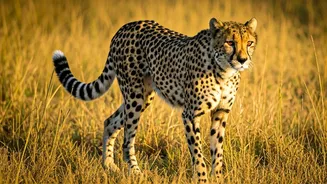Cheetah Safari Unveiled
The inauguration of India's first cheetah safari in Sheopur, Madhya Pradesh, marked a momentous occasion for wildlife conservation and tourism. This innovative
project offers a unique opportunity to witness these incredible animals in a natural environment. The safari, a first of its kind, is meticulously designed to provide a safe and enriching experience for both the cheetahs and visitors. Sheopur, known for its biodiversity, now boasts an attraction that underscores India's commitment to protecting its wildlife heritage. This initiative is expected to attract visitors from far and wide, fueling ecotourism while fostering awareness and support for cheetah conservation efforts.
Planning Your Visit
Planning a visit to the cheetah safari requires some key considerations. Information about booking procedures, ticket prices, and operational times are essential for a hassle-free experience. Prospective visitors should familiarize themselves with the guidelines set by the park authorities to ensure a smooth and enjoyable safari. Booking information, which is accessible through the official channels, outlines necessary steps for reserving your spot, from online registration to payment options. Additionally, visitors must adhere to safety regulations and guidelines during the safari to guarantee the well-being of the cheetahs and other wildlife in the area. Checking the most up-to-date information regarding accessibility, as well as any seasonal adjustments to opening times, is recommended before finalizing your travel plans.
What To Expect
A visit to the cheetah safari promises an immersive wildlife encounter. The safari route is carefully designed to provide optimal viewing opportunities, allowing visitors to observe cheetahs in their natural habitat. The experience also includes insights into the cheetahs' behavior, conservation efforts, and the wider ecosystem. Expect knowledgeable guides providing educational briefings and interpreting wildlife signs, helping visitors gain a deeper understanding of cheetah ecology. Visitors are likely to find themselves captivated by the grace and speed of these magnificent animals as they roam within the protected enclosure. This experience aims to educate and create an appreciation for the biodiversity of the region while promoting conservation. Visitors can anticipate a blend of adventure, learning, and awe-inspiring natural encounters.
Conservation Importance
The establishment of the cheetah safari holds significant importance for cheetah conservation and habitat preservation in India. The project aims to protect and bolster cheetah populations by providing a safe, controlled environment for breeding and increasing numbers. In addition, it contributes to the overall conservation of Sheopur's biodiversity. The safari promotes and funds the necessary conservation initiatives by generating revenue that is directly channeled into protecting the welfare of cheetahs and their environment. In doing so, the safari also works to improve public awareness regarding the importance of preserving endangered species and maintaining the ecological balance of the region. The goal is to create a sustainable approach that combines tourism with active conservation initiatives, benefiting both the environment and the local community.
Supporting Wildlife Conservation
By visiting the cheetah safari, tourists are not only enjoying a memorable experience but also actively supporting wildlife conservation in India. Revenue generated from the safari directly supports conservation initiatives, research, and the welfare of the cheetahs. Visitors can also learn about the various conservation efforts taking place and how they can contribute. The safari provides an example of how tourism can be intertwined with conservation, creating a system of mutual benefit. Further, supporting wildlife conservation helps safeguard biodiversity and the ecosystem in which the cheetahs and other species live. Visitors can contribute by following guidelines during their visit, supporting conservation organizations, and disseminating knowledge about the importance of preserving endangered species.















